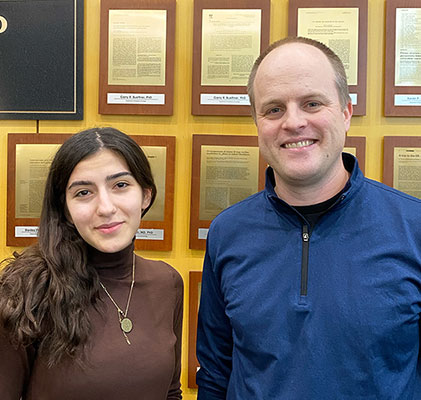 Romina Abbasian successfully defended her M.S. thesis on October 20th, 2023 and completed the Pathology M.S. program. Romina’s thesis is entitled Defense Against Bacterial Toxin Secretion Systems. She performed her thesis work in the laboratory of Dr. Dustin Bosch, where she characterized a bacterial toxic effector that is widely distributed among the predominant commensal phyla Bacillota and Bacteroidota. Additionally, Romina identified novel protective strategies inhibiting the intoxication of this effector in prey bacteria.
Romina Abbasian successfully defended her M.S. thesis on October 20th, 2023 and completed the Pathology M.S. program. Romina’s thesis is entitled Defense Against Bacterial Toxin Secretion Systems. She performed her thesis work in the laboratory of Dr. Dustin Bosch, where she characterized a bacterial toxic effector that is widely distributed among the predominant commensal phyla Bacillota and Bacteroidota. Additionally, Romina identified novel protective strategies inhibiting the intoxication of this effector in prey bacteria.
The human gut microbiome plays an integral role in health by providing benefits such as energy and nutrient digestion. However, disruption of the gut microbiome composition has been implicated in inflammatory bowel diseases such as ulcerative colitis (UC). While the gut microbiome composition is well-defined, the mechanisms governing community assembly are poorly understood. One key factor shaping the gut ecosystem is interbacterial competition mediated by toxin secretion systems like the type VI and VII secretion systems (T6SS and T7SS) utilized by the predominant gut phyla Bacteroidota and Bacillota, respectively. Through comparative metagenomic analysis of UC patients and healthy control fecal samples, the enrichment of T6SS structural genes and a specific novel toxin in UC was identified. Although this toxin was enriched in UC patients, its structural and functional properties remained unknown. Romina’s work demonstrated this toxic effector is a member of the T6SS DNAse family effector (Tde) with a globular fold structure mediating interbacterial competition among Bacteroidaceae family. She further illustrated the heterologous expression of cognate (Tdi) or orphan immunity proteins confers acquired resistance against Tde-dependent antagonism by binding and structurally disrupting Tde into two subdomains. Further phylogenetic analysis uncovered that Tde is widely distributed among Bacillota as well as Bacteroidota, with striking structural similarity between these phyla despite low sequence homology. Moreover, Romina found that certain AAA ATPase proteins in Bacteroides ovatus play an important role in responding to T6SS-mediated attack. In summary, Romina’s thesis elucidates Tde as a horizontally transferred T6SS interbacterial competition factor and structurally inhibited by Tdi proteins through a unique mechanism, providing molecular insights into microbiome community dynamics. In addition to Dr. Bosch, Drs. Ashutosh Mangalam and Boton Banfi served on Romina’s thesis committee.
Importantly, the Bacteroidota Tde section of Romina’s thesis was recently published in the journal mBio. The paper can be viewed at: